MNG10720 - CRM Strategies & Challenges in Melbourne Hotels
VerifiedAdded on 2023/06/11
|11
|2126
|176
Report
AI Summary
This report investigates CRM practices within Melbourne hotels, outlining the research problem, objectives, and design. It adopts a positivist approach using quantitative data analysis and a deductive research method. A Qualtrics survey is developed to gather data from hotel staff, focusing on CRM usage, customer service, and ICT integration. The report details the population and sample selection, data analysis techniques including frequency distribution tables, and ethical considerations to ensure objectivity and confidentiality. Ultimately, the research aims to understand CRM implementation challenges and strategies in the Melbourne hospitality sector.
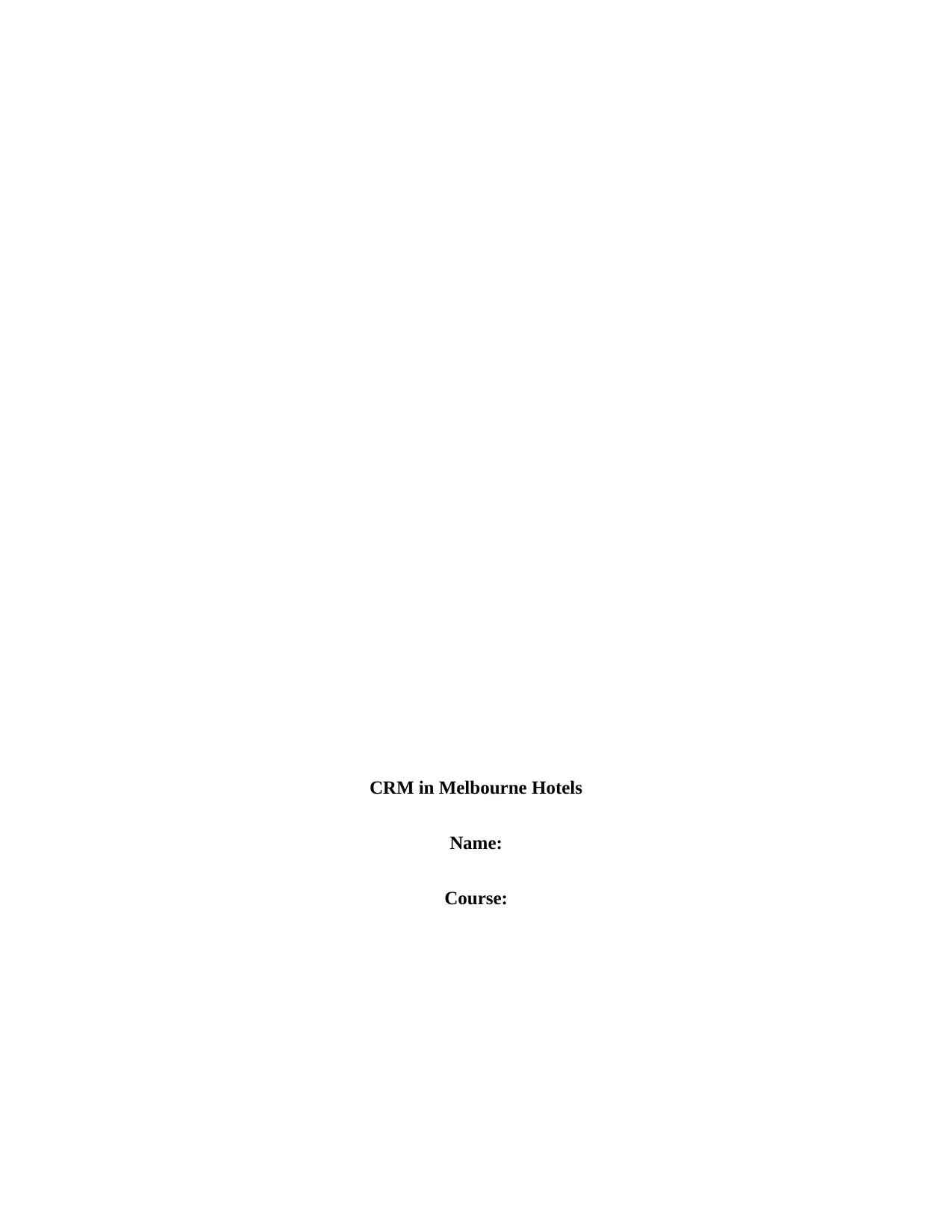
CRM in Melbourne Hotels
Name:
Course:
Name:
Course:
Paraphrase This Document
Need a fresh take? Get an instant paraphrase of this document with our AI Paraphraser
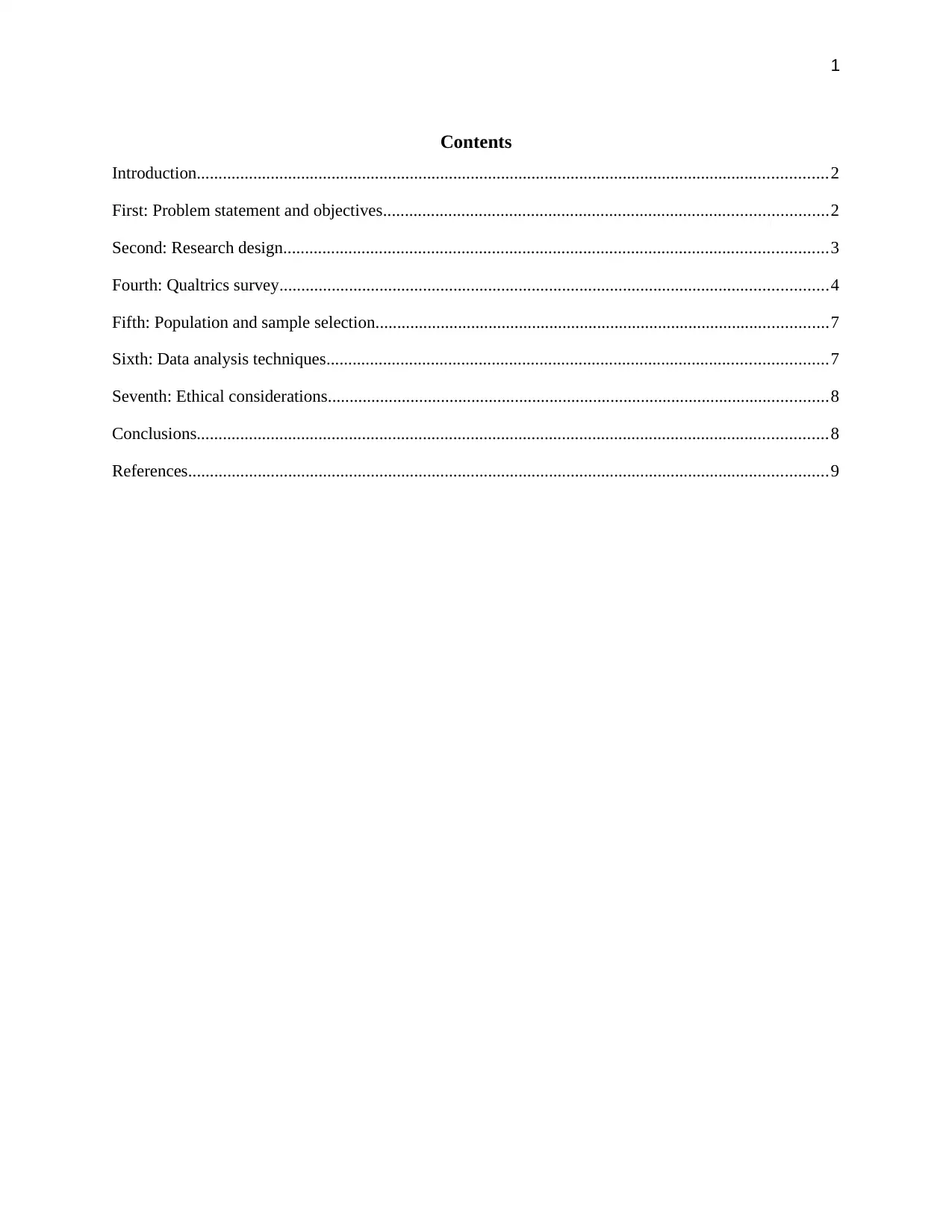
1
Contents
Introduction.................................................................................................................................................2
First: Problem statement and objectives......................................................................................................2
Second: Research design.............................................................................................................................3
Fourth: Qualtrics survey..............................................................................................................................4
Fifth: Population and sample selection........................................................................................................7
Sixth: Data analysis techniques...................................................................................................................7
Seventh: Ethical considerations...................................................................................................................8
Conclusions.................................................................................................................................................8
References...................................................................................................................................................9
Contents
Introduction.................................................................................................................................................2
First: Problem statement and objectives......................................................................................................2
Second: Research design.............................................................................................................................3
Fourth: Qualtrics survey..............................................................................................................................4
Fifth: Population and sample selection........................................................................................................7
Sixth: Data analysis techniques...................................................................................................................7
Seventh: Ethical considerations...................................................................................................................8
Conclusions.................................................................................................................................................8
References...................................................................................................................................................9
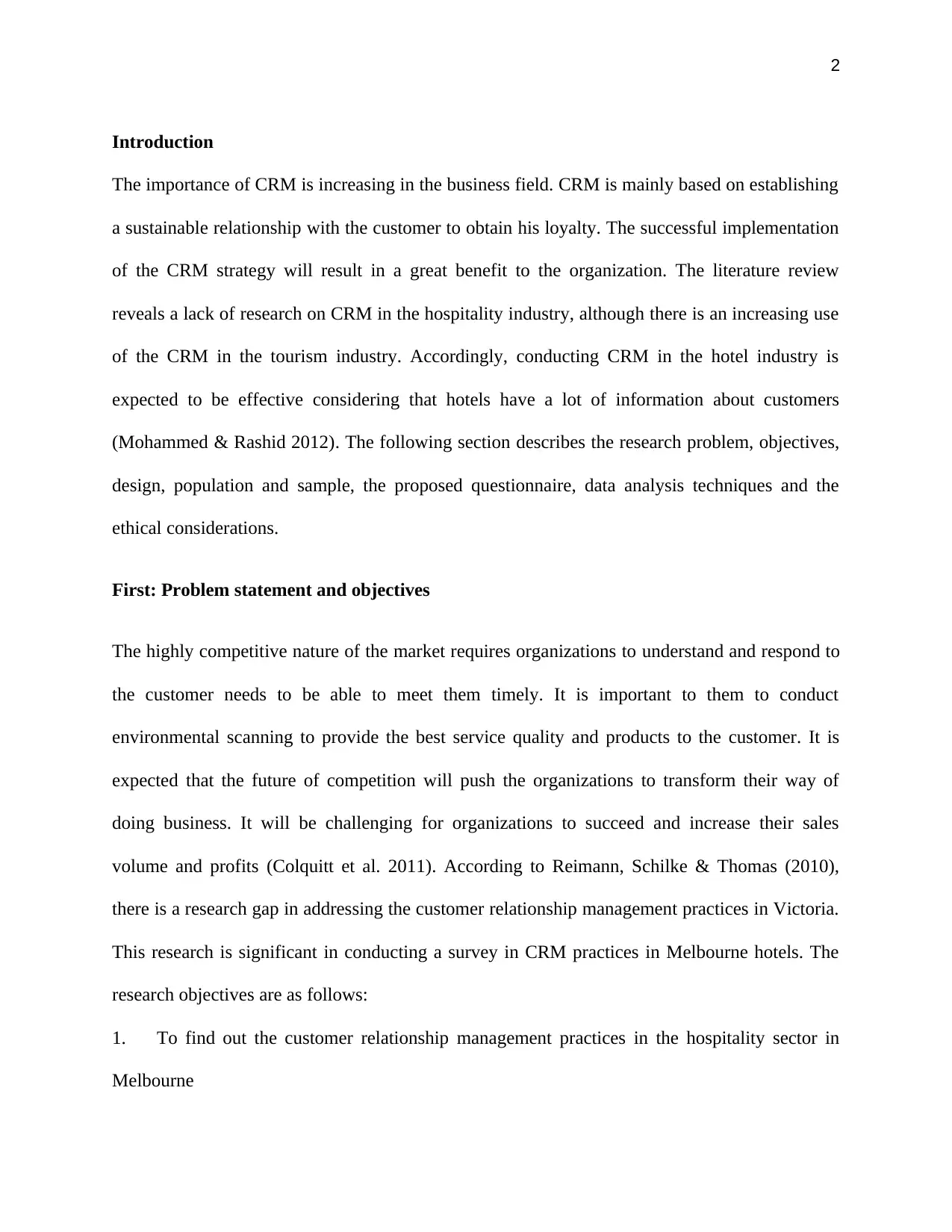
2
Introduction
The importance of CRM is increasing in the business field. CRM is mainly based on establishing
a sustainable relationship with the customer to obtain his loyalty. The successful implementation
of the CRM strategy will result in a great benefit to the organization. The literature review
reveals a lack of research on CRM in the hospitality industry, although there is an increasing use
of the CRM in the tourism industry. Accordingly, conducting CRM in the hotel industry is
expected to be effective considering that hotels have a lot of information about customers
(Mohammed & Rashid 2012). The following section describes the research problem, objectives,
design, population and sample, the proposed questionnaire, data analysis techniques and the
ethical considerations.
First: Problem statement and objectives
The highly competitive nature of the market requires organizations to understand and respond to
the customer needs to be able to meet them timely. It is important to them to conduct
environmental scanning to provide the best service quality and products to the customer. It is
expected that the future of competition will push the organizations to transform their way of
doing business. It will be challenging for organizations to succeed and increase their sales
volume and profits (Colquitt et al. 2011). According to Reimann, Schilke & Thomas (2010),
there is a research gap in addressing the customer relationship management practices in Victoria.
This research is significant in conducting a survey in CRM practices in Melbourne hotels. The
research objectives are as follows:
1. To find out the customer relationship management practices in the hospitality sector in
Melbourne
Introduction
The importance of CRM is increasing in the business field. CRM is mainly based on establishing
a sustainable relationship with the customer to obtain his loyalty. The successful implementation
of the CRM strategy will result in a great benefit to the organization. The literature review
reveals a lack of research on CRM in the hospitality industry, although there is an increasing use
of the CRM in the tourism industry. Accordingly, conducting CRM in the hotel industry is
expected to be effective considering that hotels have a lot of information about customers
(Mohammed & Rashid 2012). The following section describes the research problem, objectives,
design, population and sample, the proposed questionnaire, data analysis techniques and the
ethical considerations.
First: Problem statement and objectives
The highly competitive nature of the market requires organizations to understand and respond to
the customer needs to be able to meet them timely. It is important to them to conduct
environmental scanning to provide the best service quality and products to the customer. It is
expected that the future of competition will push the organizations to transform their way of
doing business. It will be challenging for organizations to succeed and increase their sales
volume and profits (Colquitt et al. 2011). According to Reimann, Schilke & Thomas (2010),
there is a research gap in addressing the customer relationship management practices in Victoria.
This research is significant in conducting a survey in CRM practices in Melbourne hotels. The
research objectives are as follows:
1. To find out the customer relationship management practices in the hospitality sector in
Melbourne
⊘ This is a preview!⊘
Do you want full access?
Subscribe today to unlock all pages.

Trusted by 1+ million students worldwide
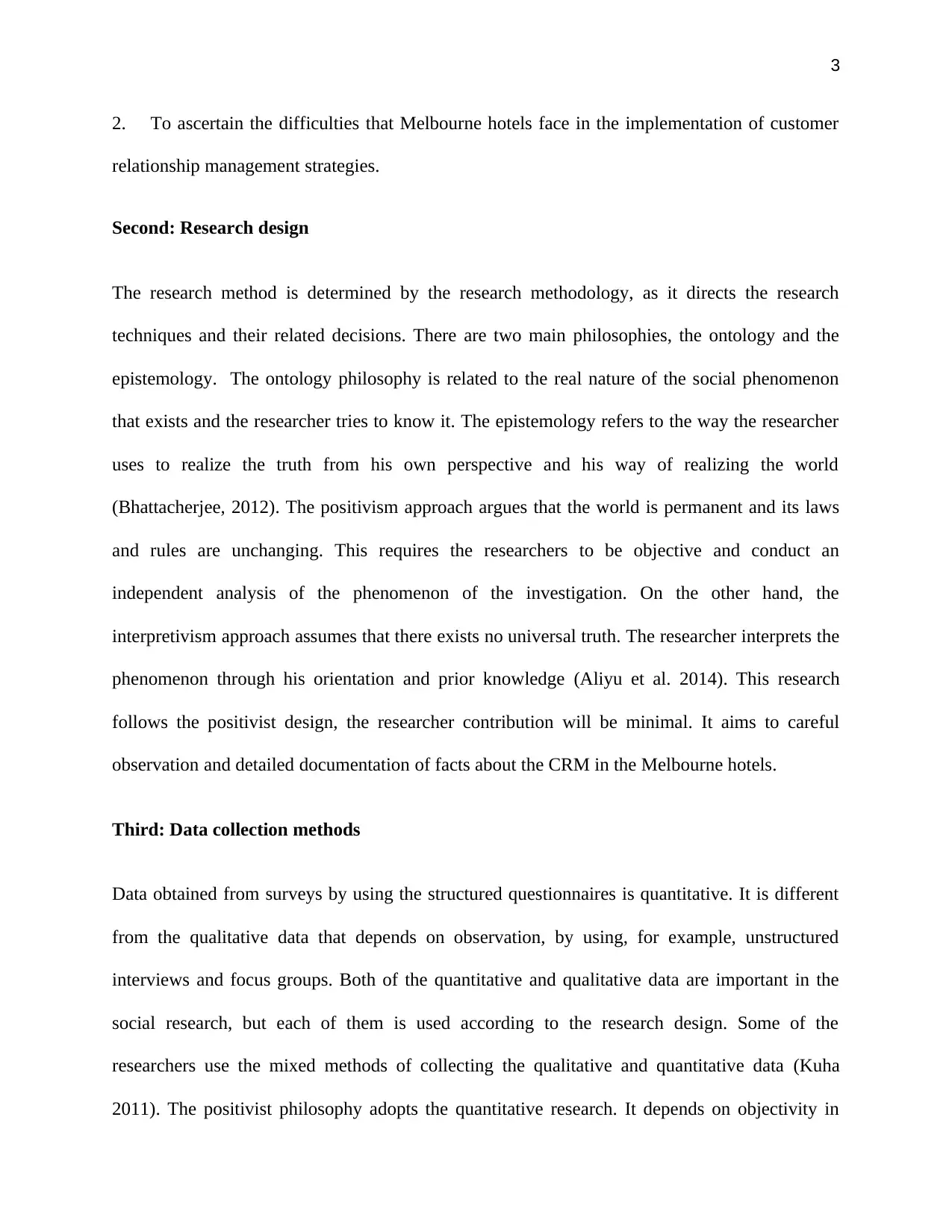
3
2. To ascertain the difficulties that Melbourne hotels face in the implementation of customer
relationship management strategies.
Second: Research design
The research method is determined by the research methodology, as it directs the research
techniques and their related decisions. There are two main philosophies, the ontology and the
epistemology. The ontology philosophy is related to the real nature of the social phenomenon
that exists and the researcher tries to know it. The epistemology refers to the way the researcher
uses to realize the truth from his own perspective and his way of realizing the world
(Bhattacherjee, 2012). The positivism approach argues that the world is permanent and its laws
and rules are unchanging. This requires the researchers to be objective and conduct an
independent analysis of the phenomenon of the investigation. On the other hand, the
interpretivism approach assumes that there exists no universal truth. The researcher interprets the
phenomenon through his orientation and prior knowledge (Aliyu et al. 2014). This research
follows the positivist design, the researcher contribution will be minimal. It aims to careful
observation and detailed documentation of facts about the CRM in the Melbourne hotels.
Third: Data collection methods
Data obtained from surveys by using the structured questionnaires is quantitative. It is different
from the qualitative data that depends on observation, by using, for example, unstructured
interviews and focus groups. Both of the quantitative and qualitative data are important in the
social research, but each of them is used according to the research design. Some of the
researchers use the mixed methods of collecting the qualitative and quantitative data (Kuha
2011). The positivist philosophy adopts the quantitative research. It depends on objectivity in
2. To ascertain the difficulties that Melbourne hotels face in the implementation of customer
relationship management strategies.
Second: Research design
The research method is determined by the research methodology, as it directs the research
techniques and their related decisions. There are two main philosophies, the ontology and the
epistemology. The ontology philosophy is related to the real nature of the social phenomenon
that exists and the researcher tries to know it. The epistemology refers to the way the researcher
uses to realize the truth from his own perspective and his way of realizing the world
(Bhattacherjee, 2012). The positivism approach argues that the world is permanent and its laws
and rules are unchanging. This requires the researchers to be objective and conduct an
independent analysis of the phenomenon of the investigation. On the other hand, the
interpretivism approach assumes that there exists no universal truth. The researcher interprets the
phenomenon through his orientation and prior knowledge (Aliyu et al. 2014). This research
follows the positivist design, the researcher contribution will be minimal. It aims to careful
observation and detailed documentation of facts about the CRM in the Melbourne hotels.
Third: Data collection methods
Data obtained from surveys by using the structured questionnaires is quantitative. It is different
from the qualitative data that depends on observation, by using, for example, unstructured
interviews and focus groups. Both of the quantitative and qualitative data are important in the
social research, but each of them is used according to the research design. Some of the
researchers use the mixed methods of collecting the qualitative and quantitative data (Kuha
2011). The positivist philosophy adopts the quantitative research. It depends on objectivity in
Paraphrase This Document
Need a fresh take? Get an instant paraphrase of this document with our AI Paraphraser
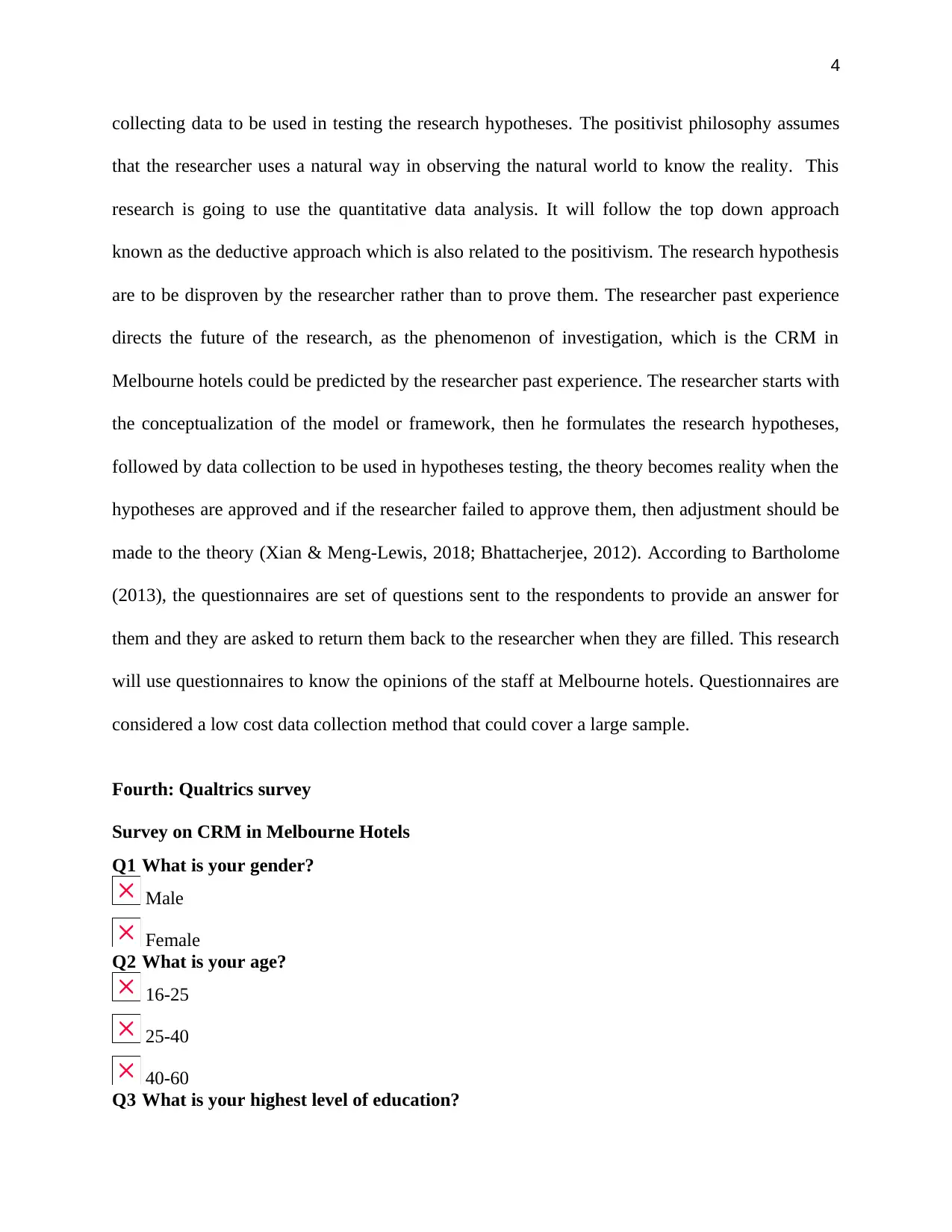
4
collecting data to be used in testing the research hypotheses. The positivist philosophy assumes
that the researcher uses a natural way in observing the natural world to know the reality. This
research is going to use the quantitative data analysis. It will follow the top down approach
known as the deductive approach which is also related to the positivism. The research hypothesis
are to be disproven by the researcher rather than to prove them. The researcher past experience
directs the future of the research, as the phenomenon of investigation, which is the CRM in
Melbourne hotels could be predicted by the researcher past experience. The researcher starts with
the conceptualization of the model or framework, then he formulates the research hypotheses,
followed by data collection to be used in hypotheses testing, the theory becomes reality when the
hypotheses are approved and if the researcher failed to approve them, then adjustment should be
made to the theory (Xian & Meng-Lewis, 2018; Bhattacherjee, 2012). According to Bartholome
(2013), the questionnaires are set of questions sent to the respondents to provide an answer for
them and they are asked to return them back to the researcher when they are filled. This research
will use questionnaires to know the opinions of the staff at Melbourne hotels. Questionnaires are
considered a low cost data collection method that could cover a large sample.
Fourth: Qualtrics survey
Survey on CRM in Melbourne Hotels
Q1 What is your gender?
Male
Female
Q2 What is your age?
16-25
25-40
40-60
Q3 What is your highest level of education?
collecting data to be used in testing the research hypotheses. The positivist philosophy assumes
that the researcher uses a natural way in observing the natural world to know the reality. This
research is going to use the quantitative data analysis. It will follow the top down approach
known as the deductive approach which is also related to the positivism. The research hypothesis
are to be disproven by the researcher rather than to prove them. The researcher past experience
directs the future of the research, as the phenomenon of investigation, which is the CRM in
Melbourne hotels could be predicted by the researcher past experience. The researcher starts with
the conceptualization of the model or framework, then he formulates the research hypotheses,
followed by data collection to be used in hypotheses testing, the theory becomes reality when the
hypotheses are approved and if the researcher failed to approve them, then adjustment should be
made to the theory (Xian & Meng-Lewis, 2018; Bhattacherjee, 2012). According to Bartholome
(2013), the questionnaires are set of questions sent to the respondents to provide an answer for
them and they are asked to return them back to the researcher when they are filled. This research
will use questionnaires to know the opinions of the staff at Melbourne hotels. Questionnaires are
considered a low cost data collection method that could cover a large sample.
Fourth: Qualtrics survey
Survey on CRM in Melbourne Hotels
Q1 What is your gender?
Male
Female
Q2 What is your age?
16-25
25-40
40-60
Q3 What is your highest level of education?
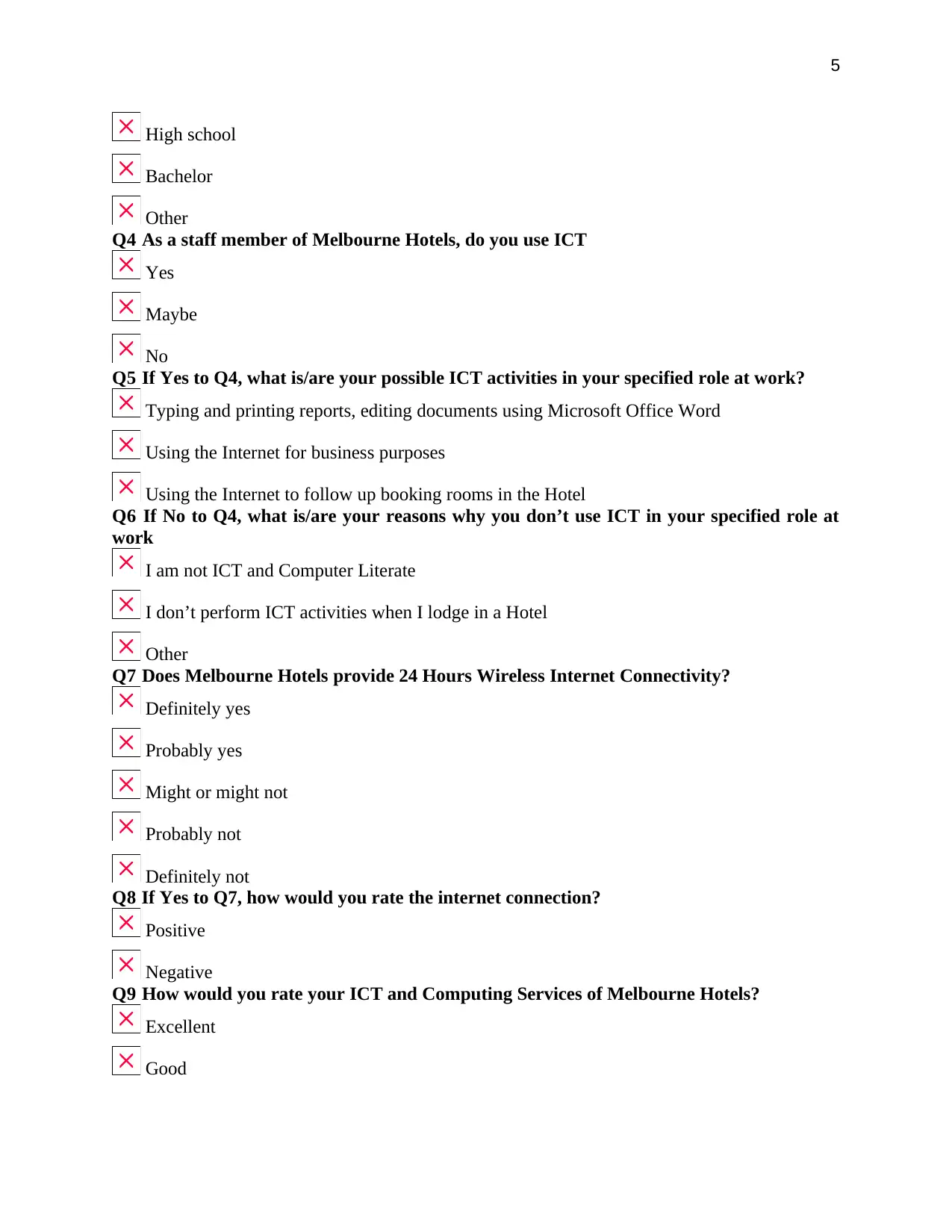
5
High school
Bachelor
Other
Q4 As a staff member of Melbourne Hotels, do you use ICT
Yes
Maybe
No
Q5 If Yes to Q4, what is/are your possible ICT activities in your specified role at work?
Typing and printing reports, editing documents using Microsoft Office Word
Using the Internet for business purposes
Using the Internet to follow up booking rooms in the Hotel
Q6 If No to Q4, what is/are your reasons why you don’t use ICT in your specified role at
work
I am not ICT and Computer Literate
I don’t perform ICT activities when I lodge in a Hotel
Other
Q7 Does Melbourne Hotels provide 24 Hours Wireless Internet Connectivity?
Definitely yes
Probably yes
Might or might not
Probably not
Definitely not
Q8 If Yes to Q7, how would you rate the internet connection?
Positive
Negative
Q9 How would you rate your ICT and Computing Services of Melbourne Hotels?
Excellent
Good
High school
Bachelor
Other
Q4 As a staff member of Melbourne Hotels, do you use ICT
Yes
Maybe
No
Q5 If Yes to Q4, what is/are your possible ICT activities in your specified role at work?
Typing and printing reports, editing documents using Microsoft Office Word
Using the Internet for business purposes
Using the Internet to follow up booking rooms in the Hotel
Q6 If No to Q4, what is/are your reasons why you don’t use ICT in your specified role at
work
I am not ICT and Computer Literate
I don’t perform ICT activities when I lodge in a Hotel
Other
Q7 Does Melbourne Hotels provide 24 Hours Wireless Internet Connectivity?
Definitely yes
Probably yes
Might or might not
Probably not
Definitely not
Q8 If Yes to Q7, how would you rate the internet connection?
Positive
Negative
Q9 How would you rate your ICT and Computing Services of Melbourne Hotels?
Excellent
Good
⊘ This is a preview!⊘
Do you want full access?
Subscribe today to unlock all pages.

Trusted by 1+ million students worldwide
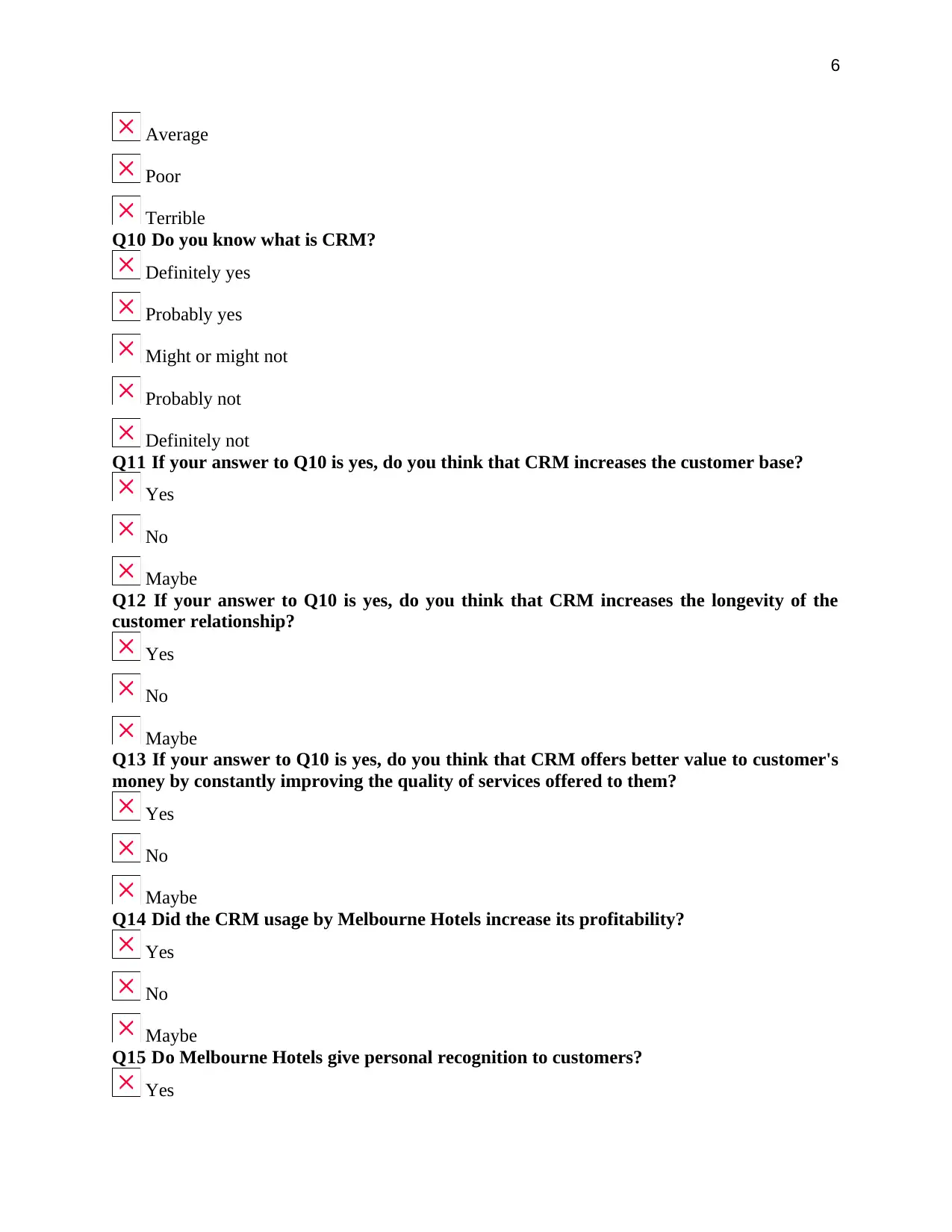
6
Average
Poor
Terrible
Q10 Do you know what is CRM?
Definitely yes
Probably yes
Might or might not
Probably not
Definitely not
Q11 If your answer to Q10 is yes, do you think that CRM increases the customer base?
Yes
No
Maybe
Q12 If your answer to Q10 is yes, do you think that CRM increases the longevity of the
customer relationship?
Yes
No
Maybe
Q13 If your answer to Q10 is yes, do you think that CRM offers better value to customer's
money by constantly improving the quality of services offered to them?
Yes
No
Maybe
Q14 Did the CRM usage by Melbourne Hotels increase its profitability?
Yes
No
Maybe
Q15 Do Melbourne Hotels give personal recognition to customers?
Yes
Average
Poor
Terrible
Q10 Do you know what is CRM?
Definitely yes
Probably yes
Might or might not
Probably not
Definitely not
Q11 If your answer to Q10 is yes, do you think that CRM increases the customer base?
Yes
No
Maybe
Q12 If your answer to Q10 is yes, do you think that CRM increases the longevity of the
customer relationship?
Yes
No
Maybe
Q13 If your answer to Q10 is yes, do you think that CRM offers better value to customer's
money by constantly improving the quality of services offered to them?
Yes
No
Maybe
Q14 Did the CRM usage by Melbourne Hotels increase its profitability?
Yes
No
Maybe
Q15 Do Melbourne Hotels give personal recognition to customers?
Yes
Paraphrase This Document
Need a fresh take? Get an instant paraphrase of this document with our AI Paraphraser
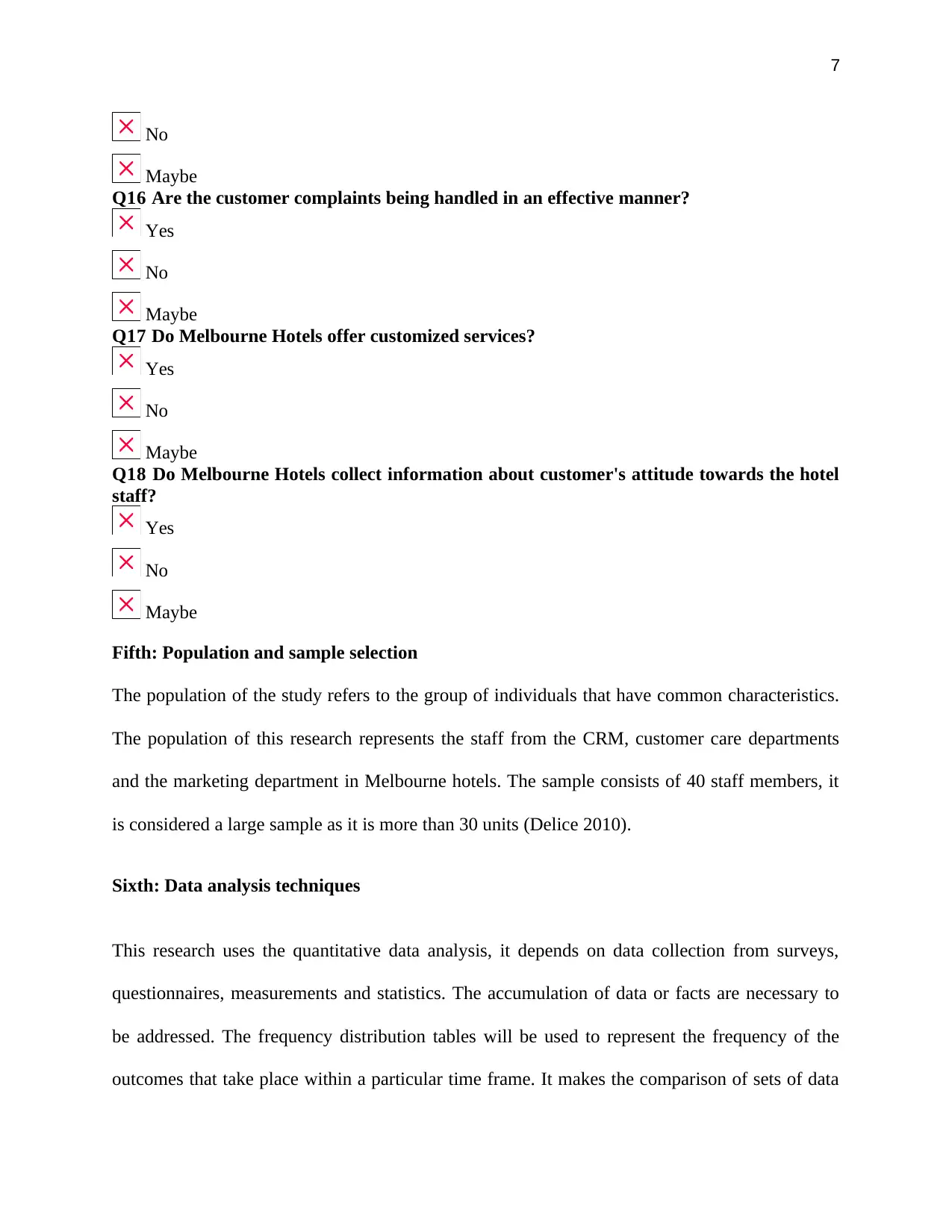
7
No
Maybe
Q16 Are the customer complaints being handled in an effective manner?
Yes
No
Maybe
Q17 Do Melbourne Hotels offer customized services?
Yes
No
Maybe
Q18 Do Melbourne Hotels collect information about customer's attitude towards the hotel
staff?
Yes
No
Maybe
Fifth: Population and sample selection
The population of the study refers to the group of individuals that have common characteristics.
The population of this research represents the staff from the CRM, customer care departments
and the marketing department in Melbourne hotels. The sample consists of 40 staff members, it
is considered a large sample as it is more than 30 units (Delice 2010).
Sixth: Data analysis techniques
This research uses the quantitative data analysis, it depends on data collection from surveys,
questionnaires, measurements and statistics. The accumulation of data or facts are necessary to
be addressed. The frequency distribution tables will be used to represent the frequency of the
outcomes that take place within a particular time frame. It makes the comparison of sets of data
No
Maybe
Q16 Are the customer complaints being handled in an effective manner?
Yes
No
Maybe
Q17 Do Melbourne Hotels offer customized services?
Yes
No
Maybe
Q18 Do Melbourne Hotels collect information about customer's attitude towards the hotel
staff?
Yes
No
Maybe
Fifth: Population and sample selection
The population of the study refers to the group of individuals that have common characteristics.
The population of this research represents the staff from the CRM, customer care departments
and the marketing department in Melbourne hotels. The sample consists of 40 staff members, it
is considered a large sample as it is more than 30 units (Delice 2010).
Sixth: Data analysis techniques
This research uses the quantitative data analysis, it depends on data collection from surveys,
questionnaires, measurements and statistics. The accumulation of data or facts are necessary to
be addressed. The frequency distribution tables will be used to represent the frequency of the
outcomes that take place within a particular time frame. It makes the comparison of sets of data
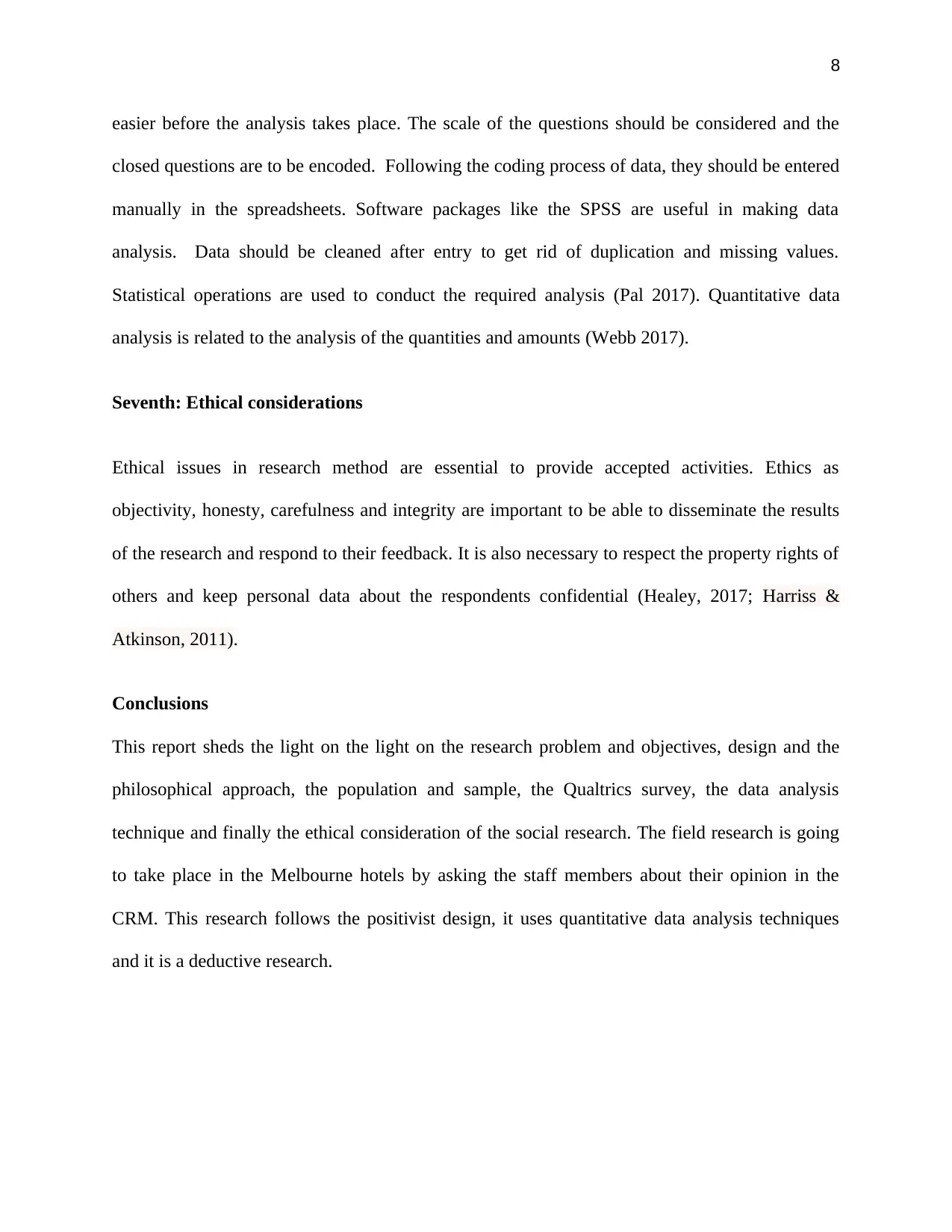
8
easier before the analysis takes place. The scale of the questions should be considered and the
closed questions are to be encoded. Following the coding process of data, they should be entered
manually in the spreadsheets. Software packages like the SPSS are useful in making data
analysis. Data should be cleaned after entry to get rid of duplication and missing values.
Statistical operations are used to conduct the required analysis (Pal 2017). Quantitative data
analysis is related to the analysis of the quantities and amounts (Webb 2017).
Seventh: Ethical considerations
Ethical issues in research method are essential to provide accepted activities. Ethics as
objectivity, honesty, carefulness and integrity are important to be able to disseminate the results
of the research and respond to their feedback. It is also necessary to respect the property rights of
others and keep personal data about the respondents confidential (Healey, 2017; Harriss &
Atkinson, 2011).
Conclusions
This report sheds the light on the light on the research problem and objectives, design and the
philosophical approach, the population and sample, the Qualtrics survey, the data analysis
technique and finally the ethical consideration of the social research. The field research is going
to take place in the Melbourne hotels by asking the staff members about their opinion in the
CRM. This research follows the positivist design, it uses quantitative data analysis techniques
and it is a deductive research.
easier before the analysis takes place. The scale of the questions should be considered and the
closed questions are to be encoded. Following the coding process of data, they should be entered
manually in the spreadsheets. Software packages like the SPSS are useful in making data
analysis. Data should be cleaned after entry to get rid of duplication and missing values.
Statistical operations are used to conduct the required analysis (Pal 2017). Quantitative data
analysis is related to the analysis of the quantities and amounts (Webb 2017).
Seventh: Ethical considerations
Ethical issues in research method are essential to provide accepted activities. Ethics as
objectivity, honesty, carefulness and integrity are important to be able to disseminate the results
of the research and respond to their feedback. It is also necessary to respect the property rights of
others and keep personal data about the respondents confidential (Healey, 2017; Harriss &
Atkinson, 2011).
Conclusions
This report sheds the light on the light on the research problem and objectives, design and the
philosophical approach, the population and sample, the Qualtrics survey, the data analysis
technique and finally the ethical consideration of the social research. The field research is going
to take place in the Melbourne hotels by asking the staff members about their opinion in the
CRM. This research follows the positivist design, it uses quantitative data analysis techniques
and it is a deductive research.
⊘ This is a preview!⊘
Do you want full access?
Subscribe today to unlock all pages.

Trusted by 1+ million students worldwide
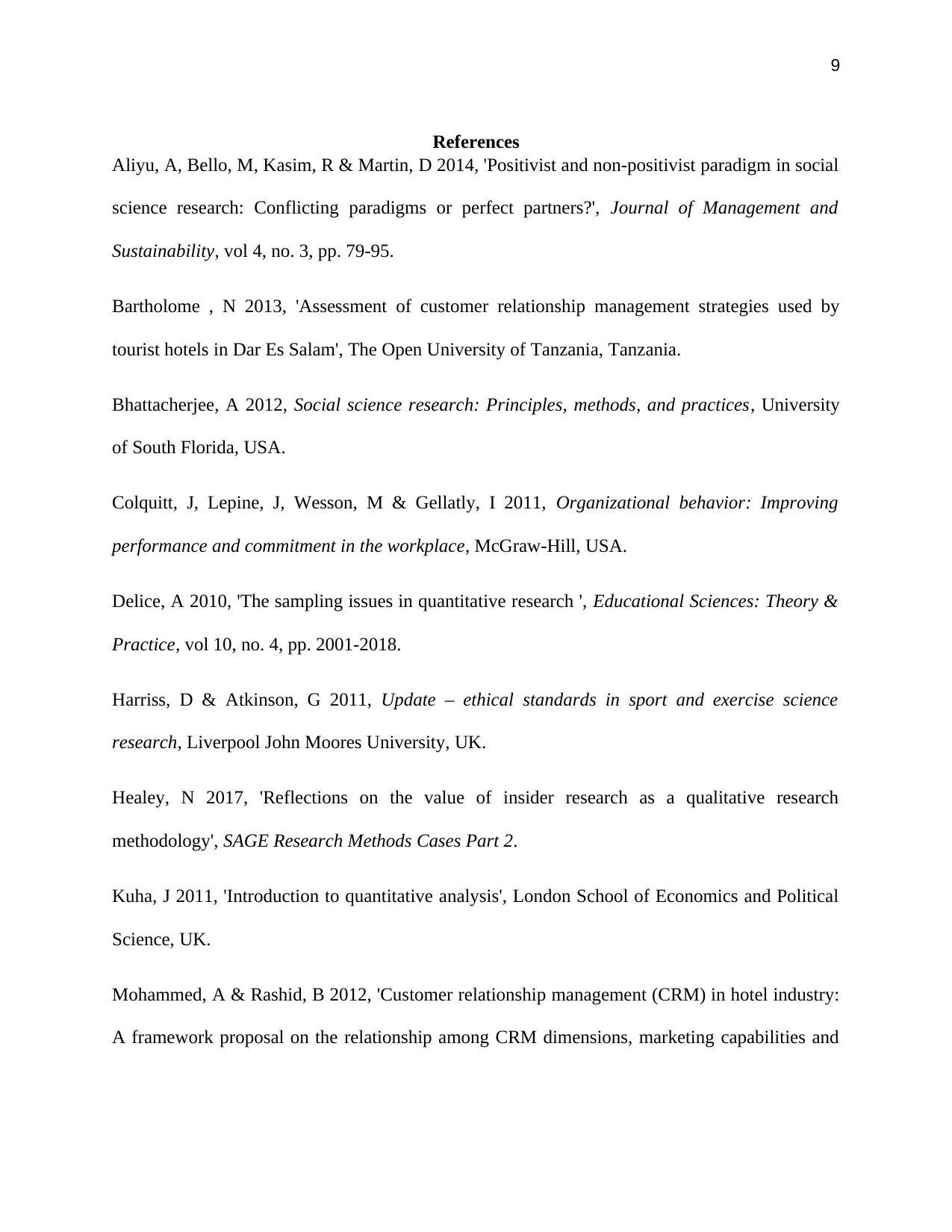
9
References
Aliyu, A, Bello, M, Kasim, R & Martin, D 2014, 'Positivist and non-positivist paradigm in social
science research: Conflicting paradigms or perfect partners?', Journal of Management and
Sustainability, vol 4, no. 3, pp. 79-95.
Bartholome , N 2013, 'Assessment of customer relationship management strategies used by
tourist hotels in Dar Es Salam', The Open University of Tanzania, Tanzania.
Bhattacherjee, A 2012, Social science research: Principles, methods, and practices, University
of South Florida, USA.
Colquitt, J, Lepine, J, Wesson, M & Gellatly, I 2011, Organizational behavior: Improving
performance and commitment in the workplace, McGraw-Hill, USA.
Delice, A 2010, 'The sampling issues in quantitative research ', Educational Sciences: Theory &
Practice, vol 10, no. 4, pp. 2001-2018.
Harriss, D & Atkinson, G 2011, Update – ethical standards in sport and exercise science
research, Liverpool John Moores University, UK.
Healey, N 2017, 'Reflections on the value of insider research as a qualitative research
methodology', SAGE Research Methods Cases Part 2.
Kuha, J 2011, 'Introduction to quantitative analysis', London School of Economics and Political
Science, UK.
Mohammed, A & Rashid, B 2012, 'Customer relationship management (CRM) in hotel industry:
A framework proposal on the relationship among CRM dimensions, marketing capabilities and
References
Aliyu, A, Bello, M, Kasim, R & Martin, D 2014, 'Positivist and non-positivist paradigm in social
science research: Conflicting paradigms or perfect partners?', Journal of Management and
Sustainability, vol 4, no. 3, pp. 79-95.
Bartholome , N 2013, 'Assessment of customer relationship management strategies used by
tourist hotels in Dar Es Salam', The Open University of Tanzania, Tanzania.
Bhattacherjee, A 2012, Social science research: Principles, methods, and practices, University
of South Florida, USA.
Colquitt, J, Lepine, J, Wesson, M & Gellatly, I 2011, Organizational behavior: Improving
performance and commitment in the workplace, McGraw-Hill, USA.
Delice, A 2010, 'The sampling issues in quantitative research ', Educational Sciences: Theory &
Practice, vol 10, no. 4, pp. 2001-2018.
Harriss, D & Atkinson, G 2011, Update – ethical standards in sport and exercise science
research, Liverpool John Moores University, UK.
Healey, N 2017, 'Reflections on the value of insider research as a qualitative research
methodology', SAGE Research Methods Cases Part 2.
Kuha, J 2011, 'Introduction to quantitative analysis', London School of Economics and Political
Science, UK.
Mohammed, A & Rashid, B 2012, 'Customer relationship management (CRM) in hotel industry:
A framework proposal on the relationship among CRM dimensions, marketing capabilities and
Paraphrase This Document
Need a fresh take? Get an instant paraphrase of this document with our AI Paraphraser
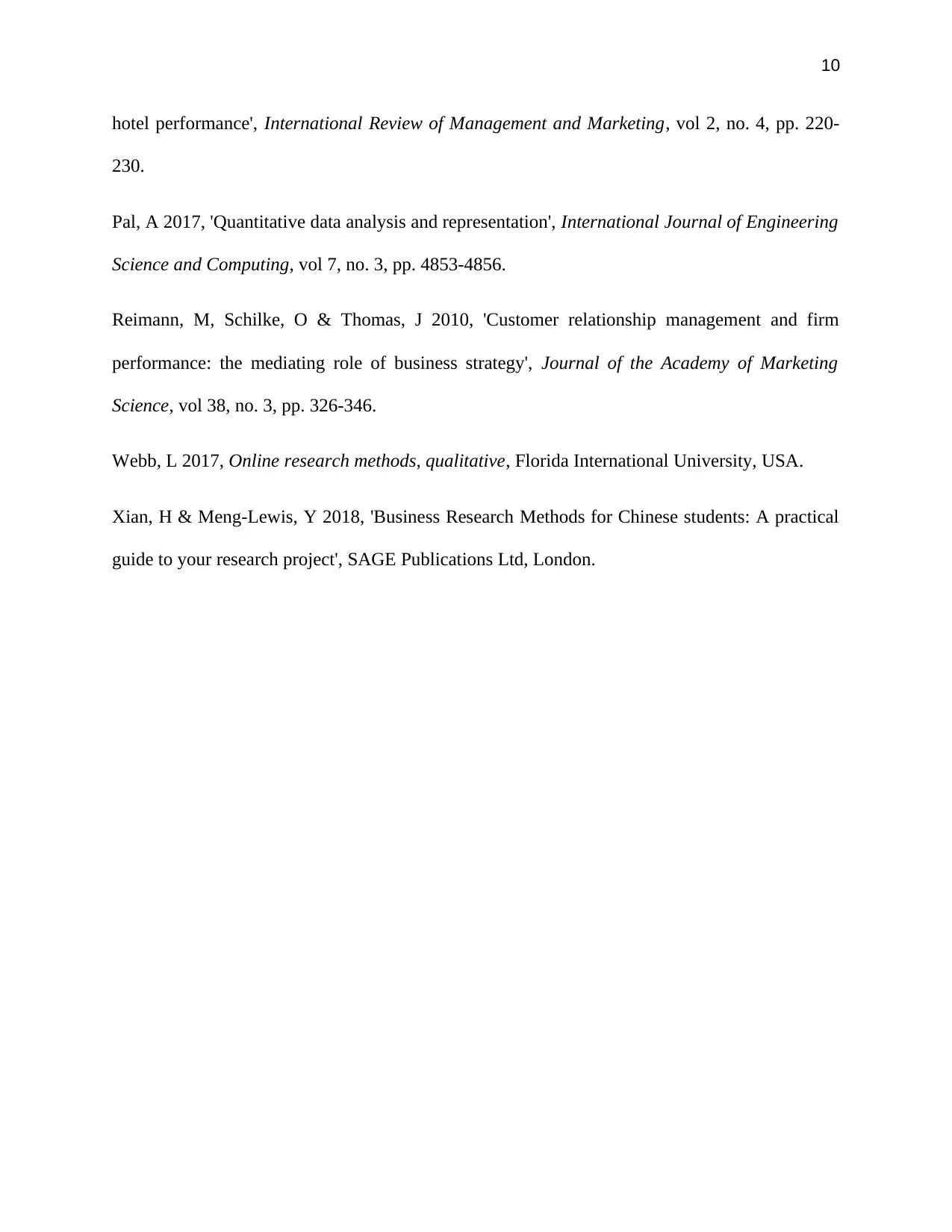
10
hotel performance', International Review of Management and Marketing, vol 2, no. 4, pp. 220-
230.
Pal, A 2017, 'Quantitative data analysis and representation', International Journal of Engineering
Science and Computing, vol 7, no. 3, pp. 4853-4856.
Reimann, M, Schilke, O & Thomas, J 2010, 'Customer relationship management and firm
performance: the mediating role of business strategy', Journal of the Academy of Marketing
Science, vol 38, no. 3, pp. 326-346.
Webb, L 2017, Online research methods, qualitative, Florida International University, USA.
Xian, H & Meng-Lewis, Y 2018, 'Business Research Methods for Chinese students: A practical
guide to your research project', SAGE Publications Ltd, London.
hotel performance', International Review of Management and Marketing, vol 2, no. 4, pp. 220-
230.
Pal, A 2017, 'Quantitative data analysis and representation', International Journal of Engineering
Science and Computing, vol 7, no. 3, pp. 4853-4856.
Reimann, M, Schilke, O & Thomas, J 2010, 'Customer relationship management and firm
performance: the mediating role of business strategy', Journal of the Academy of Marketing
Science, vol 38, no. 3, pp. 326-346.
Webb, L 2017, Online research methods, qualitative, Florida International University, USA.
Xian, H & Meng-Lewis, Y 2018, 'Business Research Methods for Chinese students: A practical
guide to your research project', SAGE Publications Ltd, London.
1 out of 11
Related Documents
Your All-in-One AI-Powered Toolkit for Academic Success.
+13062052269
info@desklib.com
Available 24*7 on WhatsApp / Email
![[object Object]](/_next/static/media/star-bottom.7253800d.svg)
Unlock your academic potential
Copyright © 2020–2026 A2Z Services. All Rights Reserved. Developed and managed by ZUCOL.





